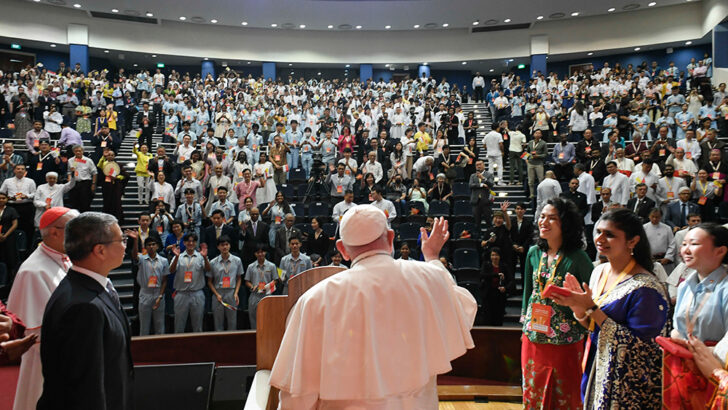“Has the Pope ever read the Bible?”
This was a serious question from a serious person on social media this week. It follows yet another controversy about remarks made by Pope Francis, this time during a visit to Indonesia, when he spoke about faith to an inter-religious meeting of young people in Singapore.
To critics, Christ’s vicar on earth is just not Catholic enough, not Christian enough.
Instead of telling this audience – which would have included Muslims, Buddhists and Hindus – that Catholicism was the one true faith, the Holy Father said all religions are a path to God.
“They are – to make a comparison – like different languages, different dialects, to get there. But God is God for everyone.”
Doubt
Pope Francis also spoke of the different ways to God – and cautioned against aggressive arguments over religion. “If you start to fight, saying ‘my religion is more important than yours, mine is true and yours isn’t’, where will this lead us?”
Well, the Pope’s remarks led to a lot of unkind criticism on social media. “Heresy!” was a common enough cry.
Now, I have to admit my own blood pressure goes up, from time to time, when I read Pope Francis’ comments. It’s not always what he says that bothers me. It is what he doesn’t say. Pope Francis, when he speaks about abortion, is wonderfully clear, very black and white. “It’s like hiring a hitman to resolve a problem.”
The Catholic faith holds the fullness of truth but there is some truth in other faiths, and all are children of God”
But sometimes the Pope’s remarks are more nuanced, open to interpretation and can be distorted or misunderstood in the age of the soundbite. Often, his remarks require thought and contemplation.
I was pondering the Pope’s remarks in Singapore when a priest friend telephoned me. The call seemed providential. “Father,” says I, “Pope Francis has just made some controversial remarks about the Catholic faith not being the true faith.”
“I doubt he said that!” said the priest. “I know,” I sighed, “But that is the impression being formed!”
We went through the text in light of Catholic teaching and what we truly believe: that God is love, that the Catholic faith holds the fullness of truth but there is some truth in other faiths, and all are children of God, made in his own image and likeness.
But doesn’t Christian baptism make you a special member of God’s family, children and heirs – otherwise what is the point? After all, didn’t Christ in his final words before his ascension give us a great commission, telling us at the end of Matthew’s Gospel to go and baptise and make disciples of all nations?
“Baptism doesn’t just make us children of God,” said my friend, “It makes us disciples of God, and in that, we make conscious choices to follow Jesus.”
Clarity
My priest friend pointed out that Pope Francis stated clearly that there is one God. “When Pope Francis speaks like this, he is trying to reach a particular group of people, and, if he causes ructions in his own camp, that can be for the good.”
“We can withstand that as a Church. The Church is bigger because God is bigger.”
But how will they know to follow Christ if we don’t tell them? “They will know him through us and be attracted to us by the way we live and by the way we are with each other,” said the priest. “The Pope is trying to meet people where they are at. You will only encourage them to come to where we are by engaging with them, by not being dismissive, or condescending or laying down the law. Christ’s attractiveness in us will lead people to baptism through the Holy Spirit. We have to trust the Holy Spirit to work through people.
“It is only when we accept where we are all at that we can engage in the hard questions: just who is God, who is the Eucharist? What is the truth of the situation? By listening, engaging, respecting and accepting each other’s position in sincerity – irrespective of our specific beliefs – we are moving towards God. So his approach is the right one,” he said.
The priest also cited the passage in Luke’s Gospel – when the apostles wanted to reign down thunder on those people who were not with them because they were – “not one of us” – but driving out demons “in your name”. Jesus states clearly: those who are not against us are with us.
Perhaps I would have preferred that Pope Francis spoke differently. But I do know that when Pope Francis is speaking to priests, and committed Catholics, he does speak differently”
“In other words,” said my friend, “They are in their own way sincerely seeking the truth. Jesus didn’t condemn them as the apostles wanted them condemned.”
And I suppose there are plenty of texts that we could debate regarding the wisdom around the Pope’s remarks. Perhaps I would have preferred that Pope Francis spoke differently. But I do know that when Pope Francis is speaking to priests, and committed Catholics, he does speak differently, encouraging them to give more time to Jesus in adoration, for example.
Open
In the debate about the Singapore remarks, it is easy to forget the point Pope Francis was making: that closed, and aggressive evangelisation is counter-productive.
I myself was once condemned as a heretic on the Boulevard San Michel, near the Convent of Adoration on the Rue Guy Lussac, where I was headed in full religious habit. An eccentric Orthodox Christian approached me. “Heretique!” he shouted. I was insulted. Was this an attractive way to spread his faith?
On a Saturday in Paris, I would sometimes pass Orthodox Jewish men in black – and greet them with, “Bon Sabbat!” But they would studiously ignore me. These men had zero interest in converting me, so their approach was effective!
In my mostly secular French class, I made friends with those disillusioned with faith – as well as two beautiful Muslim doctors. “You know,” said Rauda, who, like me in those days, always kept her head veiled. “Sometimes it is very hard to live with God. But it is impossible to live without him.”
What Catholic could argue with that?


 Martina Purdy
Martina Purdy Pope Francis waves to young people gathered for a meeting on interreligious dialogue at the Catholic Junior College in Singapore, September 13. Photo: CNS/Vatican Media
Pope Francis waves to young people gathered for a meeting on interreligious dialogue at the Catholic Junior College in Singapore, September 13. Photo: CNS/Vatican Media 